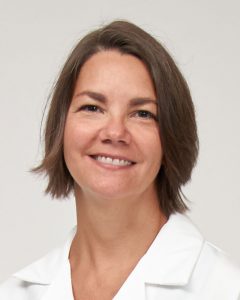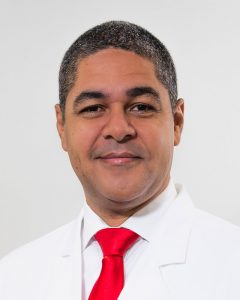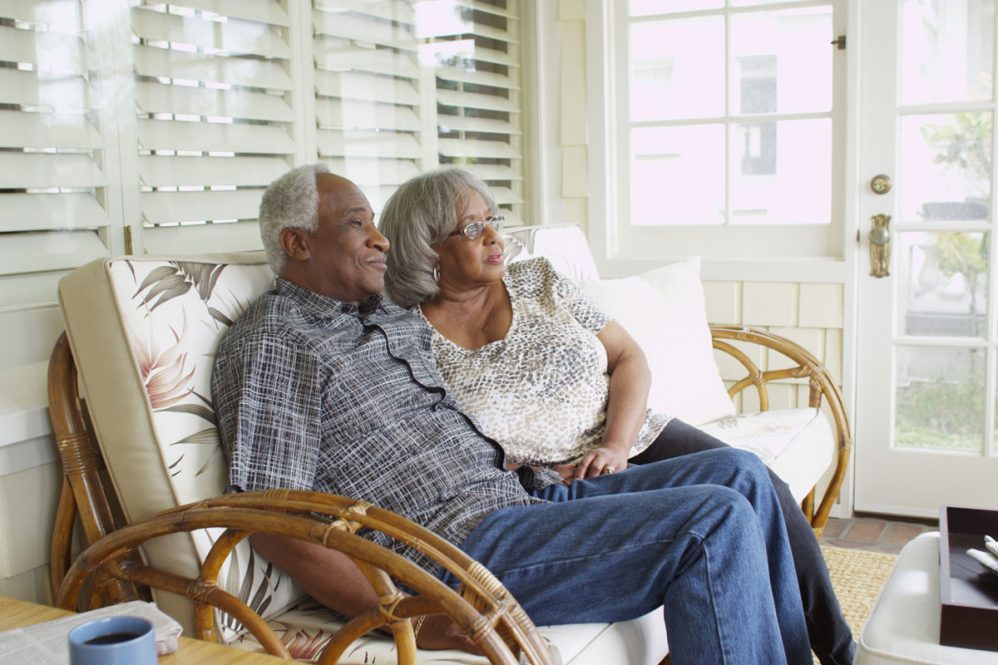Parkinson’s disease is the second most common neurodegenerative illness after Alzheimer’s disease, affecting more than one million Americans. It’s a progressive condition that leads to loss of dopamine cells in the brain, and the main symptoms associated with it are tremors, stiffness, slowed movements and balance changes.
‘Early conversations about how patients see themselves living with Parkinson’s disease helps to remove the stigma of being diagnosed with a chronic neuro-degenerative disease and allows for open dialogue with them and their loved ones.’
—Elaine Cournean, movement disorders nurse practitioner
The treatment is complex and involves a combination of medications, rehabilitation and support. Medications for Parkinson’s disease focus on increasing the dopamine levels in the brain. While new therapies have become available, including surgical options such as deep brain stimulation, there is no cure.
Dr. Bernardo Rodrigues is director of the Parkinson’s Disease and Movement Disorders Center within the UConn Health Department of Neurology, and nurse practitioner Elaine Cournean oversees the center’s new Supportive Care and Planning program. Here they explain how it can make a big difference in the care for patients and families.
Explain the importance of promoting early support and planning when treating Parkinson’s disease?
Rodrigues: Parkinson’s disease can negatively affect how patients function in their day-to-day activities, and this program helps guide patients toward a better quality of life. The impact of living with PD not only can affect patients, it can also cause distress in family members and caregivers. Symptoms such as anxiety, depression, cognitive decline, hallucinations and sleep disturbances can be challenging to handle without support.

Cournean: The Supportive Care and Planning (SCP) program is designed to help patients with PD identify ways to live a life full of meaning and satisfaction. It is based on their beliefs, desires and expectations. The SCP program is meant to help patients with PD and their families identify challenges of living with PD and meet those challenges head on. In our SCP program we are working together with patients and their families from time of diagnosis and through every stage of their lives. Early conversations about how patients see themselves living with Parkinson’s disease helps to remove the stigma of being diagnosed with a chronic neurodegenerative disease and allows for open dialogue with them and their loved ones. Their needs and wishes can change over time and we are there to address those changes and provide support and resources accordingly through a multidisciplinary approach. The sooner patients and families acknowledge the diagnosis, they are able to accept and meet challenges early on, thus improving quality of life over a longer period of time.
When did you start offering the Supportive Care and Planning program, and how has it been received?
Cournean: We started seeing patients formally as Supportive Care and Planning visits in November 2020. Patients and families have been telling us how happy they are to be able to come in and have this time to talk about what it means for them to be living with PD and how it is affecting them and their families. They have said they appreciate gaining more knowledge of how the disease can affect all aspects of their lives and getting the chance to explore where they might need help getting through certain challenges. It also has been received with excitement by health care professionals, who identify this clinic as a model of excellence in patient-centered care.
‘We believe that the secret for a happy and healthy life is good understanding of the challenges and thoughtful planning.’
—Dr. Bernardo Rodrigues
Who are the best candidates for this service?
Rodrigues: We wish to end the idea that a patient should only learn about their conditions or planning for the future once the disease has advanced. We believe that the secret for a happy and healthy life is good understanding of the challenges and thoughtful planning. We are offering this program to all our Parkinson’s disease and Related Disorders (PDRD) patients from the moment of diagnosis.
What are the challenges of living with and/or caring for someone who has Parkinson’s disease that people should know before they find out for themselves?
Rodrigues: The challenges of living with and/or caring for someone who has PD are quite broad because PD can cause both motor (physical) symptoms and non-motor (nonphysical) symptoms. PD’s distinctive motor symptoms are resting tremors, muscle stiffness, slow movements and balance problems. Non-motor features can include disturbance of sense of smell, depression and anxiety, skin problems, fatigue, low blood pressure, urinary problems, constipation, sleep problems, restless legs, speech and communication problems, cognitive problems, vision problems. PD patients may experience few or many of these motor and non-motor symptoms and at different levels of severity such that all bring their own unique set of challenges, which requires their own unique plan of action to address. This is typically the most difficult challenge that PD patients and their families face, because care and treatment are not “one size fits all.”
Cournean: Another challenge is the emotional impact that a diagnosis of PD can carry. It is important to monitor how this diagnosis can affect self-esteem. It can cause social embarrassment and isolation or even affect relationships. It is well known that caring for a loved one with chronic diseases can lead to depression, social and financial difficulties. Our SCP program aims to look at each PD patient and his or her family, identifies needs, and helps them to explore an action plan for living their best life as is defined by them.
How does a typical visit or conversation go, and who’s part of that conversation?
Cournean: The SCP visit is structured in a way to allow early identification of challenges, promote education regarding the disease and connect patients and families to the appropriate resources. The SCP clinic is a multidisciplinary clinic that seamlessly integrates your doctor, nurses, social workers, rehabilitation team and other health care professionals. Prior to the visit we send the patient surveys and questionnaires to identify changes in quality of life, mood changes, and overall wellbeing. We encourage our patients to bring their family members and/or caregiver to the visit so that we are addressing their needs as well.

Rodrigues: During the visit, Elaine, who is our movement disorders nurse practitioner, reviews current level of knowledge of the disease, prognosis, management, advanced therapies, and resources, and provides education to patients and families based on the outcome of that review. Questions and answers typically occur at this time to allow patients and families a sense of satisfaction in knowing by the end of the visit how PD may be affecting them now, how it may affect them over time, and what can be done about it. Physical, spiritual, emotional or psychological needs are explored and recommendations can be made on behalf of the patient to our multidisciplinary team members such as rehabilitation (physical therapy, occupational therapy, speech therapy), psychiatry, neuropsychology, urology, dietary, and chaplain services. Kristen Vavrek, our licensed clinical social worker, joins the visit to further enhance the discussion of advance directives, goals of care in the short and long term, supportive resources that may be available such as rides to medical appointments, assistance with meals, care in the home, and support groups. At the end of the visit, we may also bring in our registered nurse, Jennifer Pickert, who is the Parkinson’s Foundation Aware in Care Ambassador. Our nurse is often the point of contact for our patients during time of crisis and so they will be able to place a face to the name if they ever need to place a call to the clinic. She will also be able to give them resources such as the Parkinson’s Foundation Aware in Care kit.
How do patients, families, or caregivers get connected to this program?
Cournean: We will offer SCP visits to all our patients diagnosed with Parkinson’s disease and related disorders, and then annually as recommended by the American Academy of Neurology. SCP visits can also occur any time after that initial visit as a patient’s needs change. They are not to replace routine care by our fellowship-trained movement disorders neurologists, but offered as an extra layer of care, providing education, support and resources. If you or a loved one has been diagnosed with Parkinson’s disease, we will connect you with our movement disorders neurologist and fully integrate you with our SCP team.
How likely would insurance cover this service?
Cournean: Centers for Medicare and Medicaid do reimburse for Advance Care Planning (ACP) visits. Our SCP clinic is considered an ACP visit and therefore covered. If a patient or family member is curious about coverage for an SCP visit, they should contact their insurance company to ask about this.
Learn more about the Supportive Care and Planning program within UConn Health’s Parkinson’s Disease and Movement Disorders Center, email parkinsons@uchc.edu, or call 860-679-4888 for a consultation.



